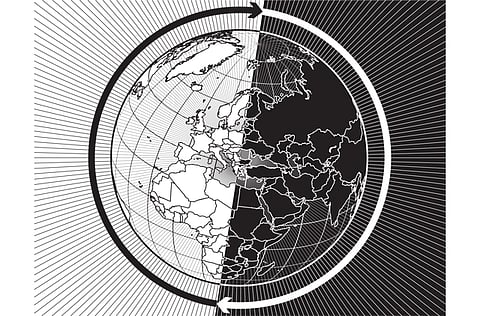Power shift from Atlantic to Pacific Rim
The tumultuous upheavals in the international system can stir optimism and pessimism in equal measure

There is nothing inevitable about globalisation; nor about the relative peace between great powers that has prevailed since the second world war. Russia’s annexation of Crimea has upturned the assumption that states cannot extend their borders by force. Rising tensions between China and its neighbours undercut the supposition that economic interdependence is a sufficiently sturdy bulwark against nationalism.
Charles Dickens observed of revolutionary France that it was the best of times and the worst of times, the spring of hope and the winter of despair. More recently, the US National Intelligence Council borrowed from A Tale of Two Cities for the title page in a report about how the world may look in 2030.
You can see why the authors alighted on Dickens’s observation. The tumultuous upheavals in the international system can stir optimism and pessimism in equal measure. The great prosperity that globalisation has brought to the east and south sits alongside the risks and insecurities that accompany the passing of an old order.
The first instinct is to celebrate the way globalisation lifts hundreds of millions of people out of poverty; the second to fret whether the rebalancing of global power will usher in a new era of might is right in international relations. Even Europeans, who have come to look at the world through normative lenses, are beginning to think that soft power may sometimes need a hard centre.
The cold war had its drawbacks —not least the threat of nuclear incineration. Then the US squandered in Iraq its pitch as a benign hegemon. But the bipolar and unipolar worlds had the advantage of predictability. The big worries now flow from uncertainty. What does China want? Is the US now at the starting line of a long retreat from its role as guarantor of the peace?
As much as Russia’s Vladimir Putin sees himself as a returning tsar, Moscow’s march into Ukraine was a reminder also that the threats can come from eclipsed as well as new powers. One question forbidden in polite diplomatic company is at what point might Japan or South Korea feel sufficiently threatened by China’s ambitions to acquire a nuclear weapon? What price great power guarantees in the wake of Putin’s scorn for the Budapest memorandum on the denuclearisation of Ukraine?
The uncertainty as much as this year’s centenary of the opening shots in the First World War makes it tempting to turn for advice to the looking glass of history. After all, history, in Alexis de Tocqueville’s metaphor, is a picture gallery stocked with a handful of originals and many more copies.
Efforts to find precise analogies are not much use: China in 2014 is not the imperial Germany of 1914. Beijing will not find persuasive justification for its designs on the east and south China seas in Theodore Roosevelt’s expulsion of the British navy from the Caribbean.
The parallels become unsettling when they focus on the broader realignment of forces in the international system. The world of the early 20th century was on the cusp of several big transitions. The age of empire was making way for that of states as Austria-Hungary and Turkey came under unbearable strain. Ethnic nationalism would soon become a powerful motivating impulse in international relations. Power was shifting from the Atlantic’s eastern to its western seaboard, from Europe to the US. And, consequence as much as cause of the great war, globalisation made way for economic protectionism.
The opening decades of the present century are witnessing a similarly momentous redistribution of power. This time the shift is from the Atlantic to the Pacific Rim. We talk about the rise of the East all the time. That is not to say the West has properly grasped the significance of the end of 200 years of hegemony.
The second transition is the power shift within states from governments to peoples. The rise of a global middle class alongside the revolution in communications technologies is challenging all the old assumptions about the relationship between individuals and states. Citizens are growing stronger in their capacity to challenge governing elites at just the moment when globalisation is weakening those same elites.
The most dangerous contemporary transition is that from the predictable order to one lacking any obvious anchor — one in which established powers lose the authority to uphold a rules-based system and rising states resist any intrusion into national sovereignty. In this world the economic competition unleashed by globalisation becomes the handmaid of an assertive nationalism that in turns trumps economic interdependence.
So, yes, there is a real danger that globalisation will fracture as it did 100 years ago — and that the multilateralism of the second half of the 20th century will make way for the return of might-is-right multipolar conflict. As dangerous in such circumstances as Chinese over-reach would be a decision by the US to withdraw from the global stage as it did during the 1920s and 1930s.
No outcome is predetermined. As the historian Margaret MacMillan writes in her account of events leading to the great war, with fewer miscalculations and a different interplay of characters Europe could have gone the other way in 1914. A century later, nuclear weapons are at once the greatest danger to the world and one of the most powerful constraints on great power war.
What was it Dickens wrote? “We were all going direct to Heaven, we were all going direct the other way”. Now, as then, there is a choice.
— Financial Times


